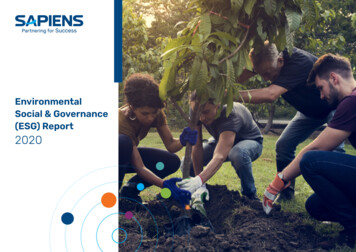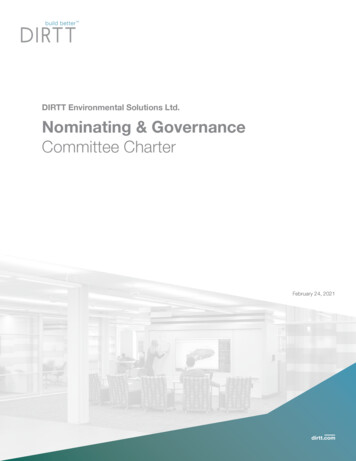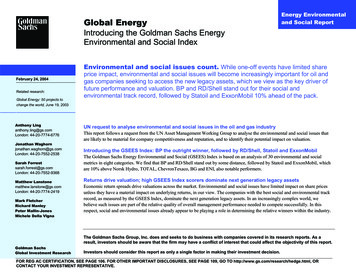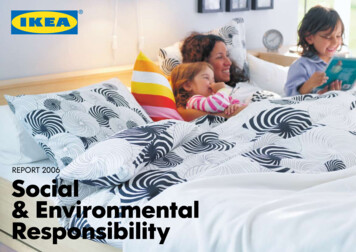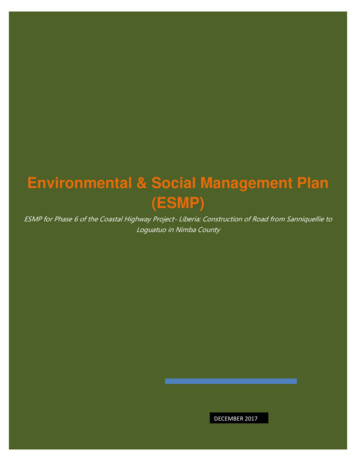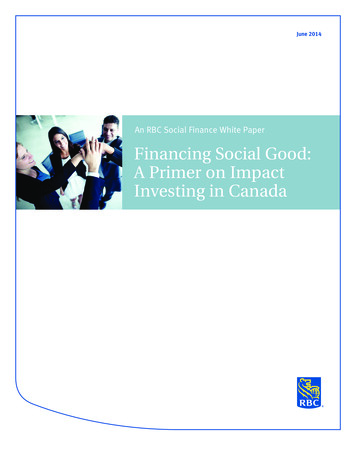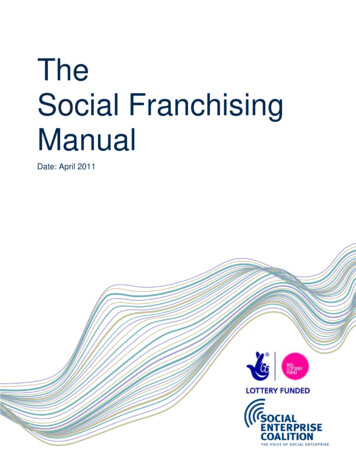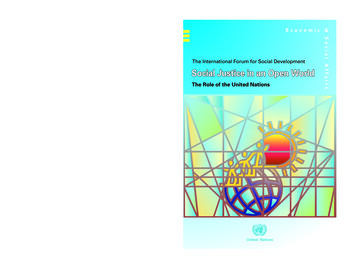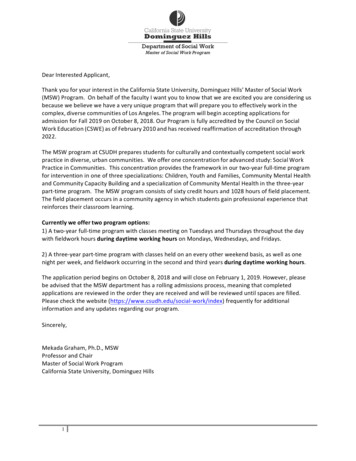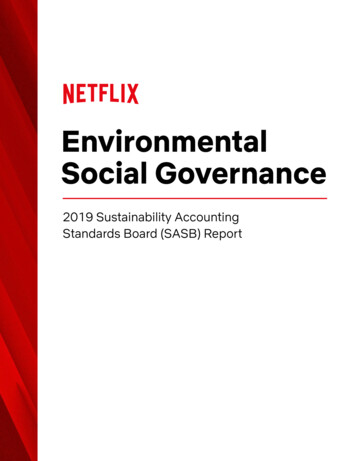
Transcription
EnvironmentalSocial Governance2019 Sustainability AccountingStandards Board (SASB) Report
At Netflix we aspire to have best in classstories across many genres.At Netflix we aspire to have best in class stories across many genres. We want more peopleto see their lives and cultures reflected on screen. And we believe that great stories can comefrom anywhere— like France, South Africa, Brazil, Turkey, Korea, Mexico or India— and be lovedeverywhere. We offer creators the ability to reach audiences all around the world, across manydevices and languages—and we work hard to provide recommendations that make it easy formembers to find something they’ll love.As more people join Netflix from different countries and cultures, we want to ensure that ourworkforce is as diverse as the communities we serve. We also understand that as we grow, we havea responsibility to be more transparent about our impact on society and our governance structures.So we will publish a report each year covering our environmental, social, and governance (ESG)performance. It will look back at the previous year and give investors as well as other third partiesinformation about our broader impact in society. The report will focus on what’s material to ourbusiness and our industry using the Sustainability Accounting Standards Board (SASB) frameworkas a benchmark.SASB guidelines differ depending on the industry. This report provides ESGinformation for the 2019 calendar year, referencing SASB’s reporting framework forthe “Internet & Media Services” and “Media & Entertainment” industries. For moreinformation on SASB, visit www.sasb.org.1
EnvironmentalWhen members start watching a show or movie on Netflix, it takes a network using energy toconnect them to that content. We support renewable projects that reduce the environmental impactof energy use globally. These projects span 15 U.S. states and 20 countries. We’re working tounderstand and minimize our environmental impact.TOPICACTIVITY METRIC - INTERNETMEDIA & SERVICES2019SASB CODEEntity-defined measureof user activitySubscribers167 millionTC-IM-000.ATOPICACCOUNTING METRICS INTERNET MEDIA & SERVICES2019SASB CODEEnvironmental Footprintof Hardware InfrastructureTotal energy consumed (MWh)94,000TC-IM-130a.1Percentage grid electricity100%Percentage renewable100%Discussion of the integration of environmentalconsiderations into strategic planning for data center needsTC-IM-130a.3For the electricity we use ourselves, we try to be as efficient as possible. This includesthe electricity we use directly in our own offices and studios. It also includes thetelecommunications facilities that are part of our content delivery network. A portion ofthat direct energy use is from non-renewable sources, so we match 100 percent of thatportion with regional renewable energy certificates. In 2019, Netflix’s direct energy usewas about 94,000 megawatt hours.Then, there’s our indirect electricity use— electricity we don’t use ourselves but isneeded to deliver Netflix to everyone. This includes the energy use of companieswe work with such as Amazon Web Services and Google Cloud, and the powerrequired to support the servers we install with internet providers. We don’t controlthis energy footprint, so we’re not able to address its efficiency directly ourselves. Butwe do account for the emissions by matching them with regional renewable energycertificates and carbon offsets. This indirect energy use was about 357,000 megawatthours in 2019.That means 100 percent of our estimated direct and indirect non-renewable power usewas matched with renewable energy certificates and carbon offsets in 2019. Netflixsupports projects across 20 countries and 15 U.S. states. We support internationalrenewable energy projects yUnited Arab ippinesSouth AfricaThailandUnited KingdomUnited StatesVietnam2
EnvironmentalWe support renewable energy projects in the following U.S. asMinnesotaNebraskaNew YorkNorth DakotaOklahomaSouth CarolinaSouth DakotaTexasBeyond our renewable energy commitments, we are working to be as sustainable aswe can in our operations. We are leaning into industry-wide practices in production asmembers of the Producers Guild of America Green Production Guide and Albert in theUnited Kingdom. When our employees, production teams and the artists we work withtravel on behalf of Netflix, that has an impact on the environment. For 2019, we offsetthe greenhouse gas (GHG) emissions associated with the majority of this air travel byinvesting in emission reduction projects. We’ll continue this practice going forward.In our offices, sustainable practices include donating excess food and reducing our useof paper. Finally, through content like Our Planet—featuring David Attenborough andsupported by the World Wildlife Fund—we work with storytellers who use their talentsto build awareness around environmental issues, reaching millions of people aroundthe world.We take our environmental impact seriously and will continue to look for ways tominimize our impact in the years ahead.3
SocialWe believe that great storytelling not only entertains but can also challenge prejudice and increaseempathy and understanding. To effectively serve our members, who come from all around theworld, we need a diverse workforce where employees—whatever their background—can do thebest work of their careers.TOPICACTIVITY METRIC - MEDIA &ENTERTAINMENT2019SASB CODETotal recipients of mediaand the number ofsubscribersSubscribers167 millionSV-ME 000.ATOPICACCOUNTING METRICS MEDIA & ENTERTAINMENT2019SASB CODEMedia Pluralism1Percentage of gender and racial/ethnic group representationfor management, professionals, and all other employeesWomen (Global)49.0%Women in management (Global)49.0%Black/African Americans (US)7.0%Black/African Americans in management (US)7.0%Hispanics/Latinx (US)7.0%Hispanics/Latinx in management (US)5.0%Asians (US)24.0%Asians in management (US)15.0%Description of policies and procedures to ensure pluralismin media contentSV-ME-260a.1SV-ME-260a.2We’ve made progress over the last few years to increase the diversity of our workforce.But we still have a lot more work to do. So in 2018, we hired Vernā Myers to leadinclusion strategy at Netflix. She is building a team to develop strategies to integratecultural diversity, inclusion and equity into all aspects of Netflix’s operations worldwide.For up to date diversity information, visit jobs.netflix.com/diversity.(continued)1Categories based on mostly U.S. reporting requirements. They do not capture our growing diversity around the world, as laws oncollecting race and ethnicity data differ outside of the U.S.4
SocialWe want more people to see their lives reflected on screen and we’re working witha wide range of creators—including in the U.S. with Ava DuVernay, Ryan O’Connell,Shonda Rhimes, Mindy Kaling, Alan Yang, America Ferrera, Ali Wong, Tyler Perryand Janet Mock—to help increase the diversity of our storytelling. A recent study bythe University of Southern California Annenberg Inclusion Initiative (“Inclusion in theDirector’s Chair”) found that 20 percent of Netflix’s original US scripted films in 2019were directed by women, nearly double the rest of the industry. However, we have workto do both maintaining that progress and increasing the number of Black, Asian andLatinX storytellers we work with.We’re also working to give new voices the chance to be heard, often for the first time,by investing in programs to help build the talent pipeline from underrepresentedcommunities. For example: in the U.S., we’re betting on first-time directors like StefonBristol and Nahnatchka Khan who made their feature directorial debuts with Netflix;in Canada and in Australia, we teamed up with local Indigenous screen organizationsto launch mentorship programs for creators from their communities; and in the UnitedKingdom, we hosted local youth for a two-day creative academy around the productionof Top Boy.While there’s still much more to do, we are proud of how our slate stacks up today. In 2019, titles like When They See Us, Orange Is the New Black, AlwaysBe My Maybe, Dolemite is My Name, Raising Dion, Homecoming, Rhythm Flow, American Son, Dear White People and Mr. Iglesias helped increaserepresentation on screen. Netflix led in nominations for the 2019 NAACP Image Awards, whichhonors the accomplishments of people of color in television, music,literature, and film in the U.S. LGBTQ characters and stories were at the center of 2019 titles like QueerEye, Tales of the City, GLOW, Special and Orange is The New Black. Netflixled in nominations for the 2019 GLAAD Media Awards honoring LGBTQ representation in U.S. TV and film.We see “international” as much more than an export market for U.S. content. Greatstories are universal: they can come from anywhere and be loved everywhere. It’swhy we’re investing in productions from many different countries, including Spain (LaCasa de Papel and Elite), India (Sacred Games), Korea (Kingdom), United Kingdom(Sex Education), Taiwan (Nowhere Man), France (Family Business), Germany (Dark),Mexico (La Casa de las Flores), Thailand (The Stranded), Turkey (The Protector), Brazil(Sintonia) and Denmark (The Rain).Our ability to dub and subtitle in over 40 languages means that people from all aroundthe world, who don’t speak the local language, can easily enjoy these stories too. Overthe last year, the amount of programming our members watch that’s not from theirhome country or the U.S. increased by 10 percent. And in the U.S., where “foreign”language entertainment has traditionally struggled, non-English language viewing onNetflix has increased 23 percent year on year.5
SocialTOPICACCOUNTING METRICS INTERNET MEDIA & SERVICES2019Data Privacy, AdvertisingStandards & Freedom ofExpressionDescription of policies and practices relating to behavioraladvertising and user privacySASB CODETC-IM-220a.1Our service is subscription-based and we do not allow third party advertising onNetflix. When members sign up for the service we ask for very little information:email, name and method of payment. We do not collect socio-demographic data likegender or race for the purposes of our viewing recommendations system. Our PrivacyStatement provides a detailed explanation of our privacy practices, including: theinformation Netflix collects or receives from each member; how we use and discloseit (including advertising that we conduct off Netflix to promote our service); and thecontrols each member has in relation to this information.Number of government requests toremove content2 (in 2019)TC-IM-220a.6We offer creators the ability to reach audiences all around the world. However, ourcatalog varies from country to country, including for rights reasons (i.e., we don’t havethe rights to show everything in every country where we operate). In some cases we’vealso been forced to remove specific titles or episodes of titles in specific countries dueto government takedown demands.Below are the titles we’ve removed to date, as of February 2020 — just nine in totalsince we launched. Beginning next year, we will report these takedowns annually. In 2015, we complied with a written demand from the New Zealand Film andVideo Labeling Body to remove The Bridge from the service in New Zealandonly. The film is classified as “objectionable” in the country. In 2017, we complied with a written demand from the Vietnamese Authorityof Broadcasting and Electronic Information (ABEI) to remove Full MetalJacket from the service in Vietnam only. In 2017, we complied with a written demand from the German Commissionfor Youth Protection (KJM) to remove Night of the Living Dead from theservice in Germany only. A version of the film is banned in the country. In 2018, we complied with a written demand from the Singapore InfocommMedia Development Authority (IMDA) to remove Cooking on High, TheLegend of 420, and Disjointed from the service in Singapore only. In 2019, we complied with a written demand from the Saudi Communicationand Information Technology Commission to remove one episode—“SaudiArabia”—from the series Patriot Act with Hasan Minhaj from the service inSaudi Arabia only.6
Social In 2019, we received a written demand from the Singapore Infocomm MediaDevelopment Authority (IMDA) to remove The Last Temptation of Christ fromthe service in Singapore only. The film is banned in the country. In 2020, we complied with a written demand from the Singapore InfocommMedia Development Authority (IMDA) to remove The Last Hangover from theservice in Singapore only.TOPICACCOUNTING METRICS INTERNET MEDIA & SERVICES2019Data SecurityDescription of approach to identifying and addressingdata security risksSASB CODETC-IM-230a.2The company has a Vice President of Information Securitywho oversees a team of employees dedicated to informationsecurity. We strive to protect sensitive information throughvarious means, such as technical safeguards, proceduralrequirements and policies, a program of monitoring to detectand address unauthorized modification or misuse, continuoustesting of aspects of our security internally and with outsidevendors, a robust incident response program, and regulartraining for employees.7
GovernanceWe seek to find the right balance of rights and responsibilities among our shareholders, our board,and our management team. Our goal is to maximize long-term shareholder value most effectively.Our board members, a third of whom are women, bring a diverse skill set in areas such as media,technology, marketing and international and government relations. We take our governance, andfeedback on it, seriously and make changes thoughtfully as needed. In some areas, our governancestructure is significantly more progressive than market practice; one example is our unique,transparent approach to informa
As more people join Netflix from different countries and cultures, we want to ensure that our workforce is as diverse as the communities we serve. We also understand that as we grow, we have a responsibility to be more transparent about our impact on society and our governance structures. So we will publish a report each year covering our environmental, social, and governance (ESG) performance .

